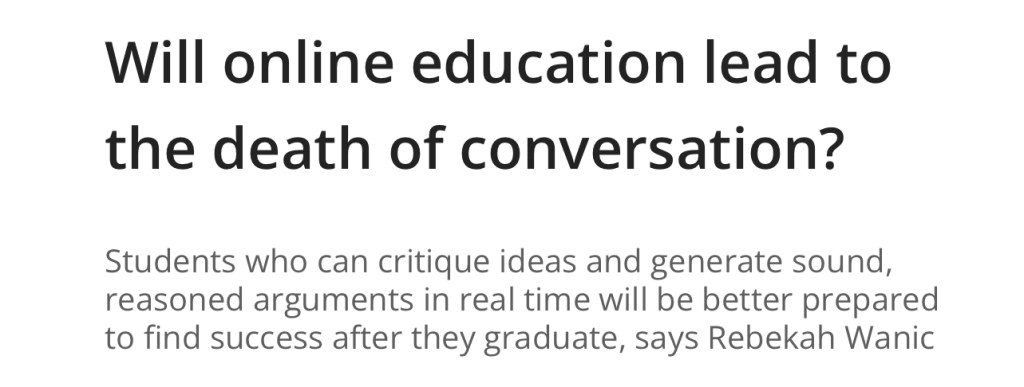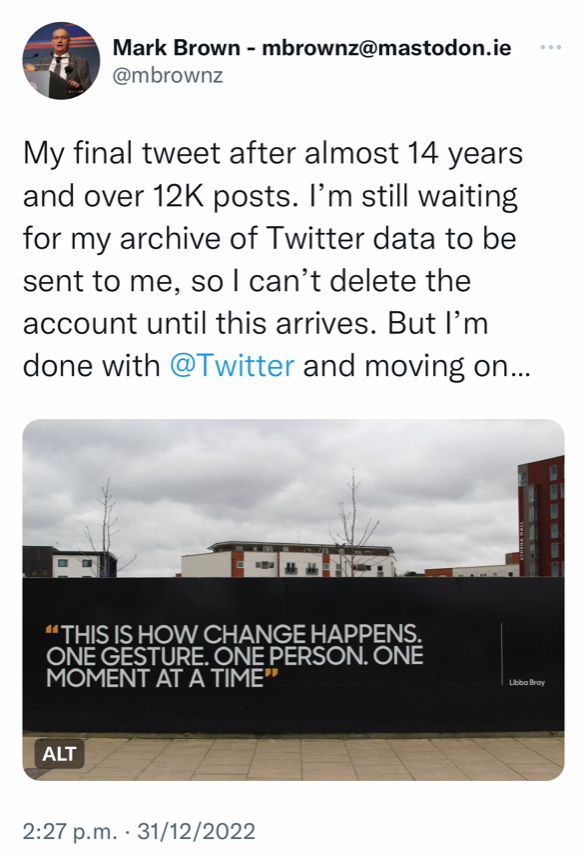It’s one thing to write a headline-grabbing title, but it’s another thing to back it up with substance, solid evidence, and scholarly critique. Unfortunately, a recent opinion piece by Rebekah Wanic (2022) asking whether online education will lead to the death of conversation fails on all counts. It’s plain wrong and misleading on many levels.

The first red flag appears in the choice of title. Even in opinion pieces, sweeping generalisations are usually a sign of sloppy scholarship. Context matters in teaching and learning and related educational research; it’s also naive to assume and misleading to imply that online education is a single all-encompassing entity. It’s not!

A digitally recorded lecture couldn’t be more different from a highly engaging asynchronous online role-play, intentionally designed to foster rich debates and conversations between learners. This month, as it happens, I’m writing a book chapter on the potential of this type of learning design which offers a type of low-tech emptiness but high-touch pedagogy for deep discussion in today’s online classroom. I first used asynchronous online role-play with students and wrote about the benefits of this pedagogical design almost 20 years ago (Brown & Murray, 2006).
As an aide, ‘yes’, I have tested ChatGPT to see what it can produce when asked about online role-play and the result lacks the specificity, depth of analysis and level of authenticity that I hope will be evident in my chapter. I might share more on this topic in another blog post.
In the meantime, hopefully, readers do not miss the irony that an online opinion piece is being used to promote the claim…
“Students who can critique ideas and generate sound, reasoned arguments in real time will be better prepared to find success after they graduate”.
Given the online nature of the opinion piece, an inherent contradiction appears in this argument. Good debate does not always need to take place in real time. Importantly, the online and offline worlds are not on binary tracks, even though the piece suggests otherwise on several occasions in distinguishing between “the real, not digitally mediated, world”. Unless you live in a developing country, the reality is that we live in a digitally mediated world where it’s almost impossible to untangle how the digital is imbued throughout our lives – for better and worse.
The challenge is how we design teaching, learning and assessment to reflect this new reality. Developments like ChatGPT only add to the importance of designing new hybrid, hi-touch pedagogical designs and teaching approaches, which goes beyond simply trying to tame the affordances of new digital technologies. The issue in question has very little to do with mode of delivery, but rather how we design for good teaching, a point already well-established in the research literature.
To answer the reverse question posed in the title of this blog of whether face-to-face teaching is killing the art of conversation, we first need to identify the full range of teaching approaches.
To avoid sloppy scholarship on my part I need to start by recognising that not all face-to-face teaching methods lend themselves to the same underlying pedagogies: a lab is fundamentally different to a lecture. The former often involves small groups working and talking together as they complete a hands-on experiment. In contrast, a traditional lecture to a large class of students can be a relatively passive learning experience with limited learner-learner interactivity. Essentially, at its worst, the teacher offers nothing more than a monologue!

That said, this characterisation of the lecture is unfair. Teachers who lecture do not all adopt the same pedagogical approach. Even when teachers adopt a traditional instructional model that primarily delivers content, it’s essential to recognise that a silent conversation may be taking place with each learner. These invisible conversations are usually overlooked in debates about the value of the traditional lecture.
Also, the physical affordances of learning spaces differ, with some contemporary lecture theatres including swivel seats for student interaction and collaborative learning (the equivalent of using online breakout rooms for small group discussion). Thus, these factors and others underscore the danger of sweeping generalisations without due regard for the context, the teacher’s pedagogical design, the nature of the subject content and the particular discipline culture.
It’s therefore ridiculous to even ask the above question in the first place.
This point aside, returning to the question of whether online education may be leading to the death of conversation, the opinion piece not only fails to acknowledge the many and varied faces of online learning but largely ignores the research evidence. There are many meta-analyses of the research literature on online education with a focus on both educational processes and learning outcomes which could have informed the piece.
Yet, the author claims that “a careful read shows most arguments [for online education] begin with and largely settle on pragmatic appeal”. Sadly, such a conclusion ignores decades of research on why many diverse and geographically dispersed adult part-time students worldwide choose to study through online distance education. In many cases, they have no other option, especially when juggling family responsibilities, work commitments, financial constraints and special learning needs. Yes, it’s important to define why an institution is investing in online education (or not) and the learner should be at the centre of this discussion.
Ironically, the author frames the opinion piece to promote debate and talks about the value of presenting reasoned arguments when they offer largely unsubstantiated opinions and scant evidence to support such sweeping statements. For example, the piece claims that a live face-to-face lecture increases the…
“social pressure to stay on task in the presence of an instructor in a way that accessing content privately does not provide”.
Yet, no evidence is provided and no consideration is given to the number of students who choose not to attend lectures even before the global pandemic. This point is an uncomfortable reality of the current learning environment that can’t be overlooked in debates about education futures. Arguably, the piece reflects wider efforts to whitewash online education with a single brush whilst trying to defend with false clarity the benefits of traditional methods in the aftermath of the pandemic.

The underlying assumption appears to be that students must attend face-to-face lectures, so their teachers can better monitor them, exert greater control over their learning, and apply social pressure to ensure that everyone is on task and paying attention.
Giving students some choice over how they learn and allowing them to multitask like many of us do in the real world is clearly bad for their learning.
There is a limited sense in which students are genuine partners in the learning experience. Perhaps what is required is a little more trust in students and a far greater effort to support instructors to design better and more engaging learning experiences – irrespective of the delivery mode. Once again, we know from a wealth of research over many years that delivery mode is not the key factor in designing good teaching and a high quality student learning experience (see for example, Zawacki-Richter & Jung, 2022).
In sum, short opinion pieces that imply face-to-face teaching is the “Gold Standard” for promoting good learning and the “art of conversation” might go unchallenged in the real time debates. However, the good news is that such critiques do not stand up as well to wider public scrutiny when published online and subject to further analysis. The key point is that readers (like many students) with the benefit of critical reflection can put such claims under the truth spotlight in their own time and at their convenience. Fortunately, this is how the real digitally mediated world works!
References
Brown, M.E., & Murray, F. M. (2005). A culture of technology critique: Low tech to high tech teacher education. in Australian Teacher Education Association 33rd Annual Conference, Australian Teacher Education Association, Lauceston, TAS. pp. 84-92. Teacher Education: Local and Global July 6-9. Gold Coast, Queensland.
Wanic, R. (2022). Will online education lead to the death of conversation? Times Higher Education Campus, 12th December. https://www.timeshighereducation.com/campus/will-online-education-lead-death-conversation
Zawacki-Richter, O., & Jung, I. (eds.). (2022). Handbook of Open, Distance, and DigitalEducation. Springer. https://link.springer.com/referencework/10.1007/978-981-19-0351-9



